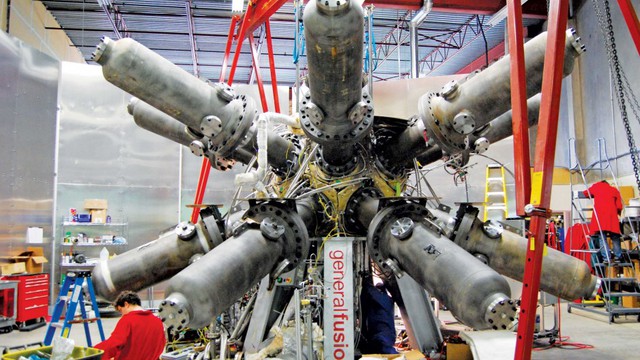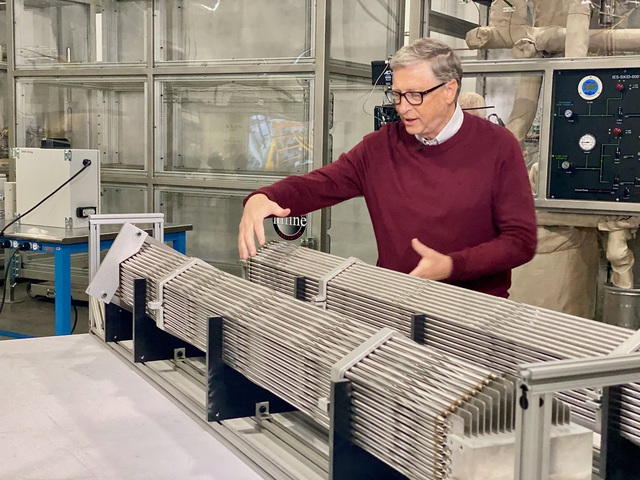Tech billionaires look to nuclear in the midst of an energy crisis
In particular, billionaire Elon Musk wrote on Twitter that nuclear is “vital” to national security, and the risk of radioactive leakage is currently being overstated. Meanwhile, venture capitalist Marc Andreessen calls for immediate construction “1,000 new super-advanced nuclear power plants in the US and Europe“.
The war Russia waged in Ukraine has fueled an idea that has emerged in recent years in the startup world, where billionaires including Bill Gates, Jeff Bezos, and Peter Thiel have all “opened their wallets.” backing the next generation of nuclear companies. No advanced reactor start-up has yet come up with a commercially viable product, but some believe a combination of technological advancements and the urgent need to get rid of the fuel. fossil fuels could be the catalyst for this industry, which has been largely strangled by strict regulations since the 1970s.
“We would not be able to talk about the innovations in nuclear energy today without the investments and vision of Silicon Valley leaders.” – according to Josh Freed, a climate and energy expert at the Third Way Public Policy Institute in Washington (USA).
Last year, venture capitalists invested a record amount, $3.4 billion, in nuclear startups — more than the entire year-over-year investment of the past decade combined, according to the research firm. rescue PitchBook. This is reflected in the fact that startups that are still in their very early stages, as well as older companies, such as Commonwealth Fusion Systems and Helion Energy Inc, have all raised investments of $500 million or more in the past year. in 2021. In the previous decade, each year, the average number of investment deals was less than 10. Last year, the number jumped to 28.
The explosion of venture capital sources comes after decades of “withering” on nuclear power. After its development in the 1950s, concerns about waste storage and safety features, along with a series of incidents at Three Mile Island, Chernobyl, and Fukushima, led to an unfavorable public view. feel about this technology. Meanwhile, high costs make nuclear power less attractive than natural gas and other alternative energy sources, not to mention policy barriers. The Watts Bar Nuclear Plant, licensed in 1973, was the last nuclear project approved by the US side. Encountered with many problems, delayed many times, faced with rising costs, it was not until 2016 that the plant started operating.
But amid growing concerns about climate change, the advantages of nuclear power are also becoming apparent. pioneer in solar energy, carbon-neutral nuclear energy; Unlike solar energy, it can continuously produce energy 24/7. This is also a path to energy self-control. The war in Ukraine sent gasoline prices in the US soaring to all-time highs earlier this month. While building more nuclear reactors won’t end the current problem – where new, more compact designs take years to get licensed and built – supporters said nuclear power could certainly be the way out of the next crisis in the future.
Recent improvements in nuclear fission – the technology to “capture” the energy released as atoms split, which were announced decades ago – include methods of safe storage of nuclear waste. and more efficient cooling systems, allowing next-generation reactors to be smaller and more efficient. Fusion startups – the technology that “captures” the energy released when atoms merge together – are also moving out of the theoretical testing phase and toward commercialization at a much faster pace than before. with prediction.

A product of General Fusion
Fusion – considered the “holy grail” of nuclear energy – has never produced more energy than is needed to actually produce a nuclear reaction. But some startups believe they’re on the verge of getting the fruition. “Silicon Valley is the foundation of the entire private fusion industry” – according to Christofer Mowry, CEO of General Fusion (based in Vancouver), a startup backed by Bezos and several other billionaires. Mowry, and a board member of the nonprofit industry organization Fusion Industry Association, says venture capital investments have helped dozens of nuclear startups thrive to the point that governments around the world are starting to take notice, for example, earlier this month, the US Congress approved it. record budget for a public-private partnership program to build new fusion devices.
David Kirtley, a former U.S. Department of Energy fusion program executive, founded a fusion startup called Helion in 2013. He then joined a Silicon Valley startup incubator, Y Combinator, where he said he learned how to “refresh” his thinking to become more ambitious. At YC, “they don’t talk about a one year timeframe. Everything is in the next month and next week“- said Kirtley.
Helion has raised more than $570 million from investors, including former YC president Sam Altman, Peter Thiel of Mithril Capital, and Facebook co-founder Dustin Moskovitz. Altman, chairman of Helion and a major shareholder in the company, said he believes fusion is the cleanest and cheapest form of energy that will one day change the world. “I regularly discuss with them how to progress faster“- said Altman.
Helion aims to achieve effective power from fusion, meaning the system can generate more power than it consumes, by 2024 and have a commercial system by the end. decade. “I wish I had joined Y Combinator 5 years early“- said Kirtley.We could have gone much further“
Nuclear fission startups could have a more immediate impact. TerraPower, founded and funded by Bill Gates, uses advanced cooling materials including molten chloride and liquid sodium to build reactors that are smaller, cheaper, and more efficient than conventional reactors. The system uses water for cooling. TerraPower intends to work with the US Department of Energy to build two reactors, of which the first commercial reactor is located in Wyoming. TerraPower said late last year that it would obtain a building permit from the Nuclear Regulatory Commission in 2023 and begin operations in 2028.

Bill Gates and TerraPower’s new model of nuclear plant
TerraPower has recently received attention from many countries, including Romania and Poland, in the wake of Russia’s attack on Ukraine, according to Foreign Affairs Director Jeff Navin. “Not surprisingly, we found that the places that are most interested in technology are those that border Russia and depend on them for energy.” – Navin said. John Kotek, vice president of policy development and public relations at the Institute of Nuclear Energy in Washington, said the institute’s member companies have started to get busier since Russia started. military campaign.
Europe is an area where volume concerns are clearly expressed, because most of its fuel is imported from Russia. Some countries that used to ban nuclear energy are now thinking about it again. “Germany would have needed less natural gas if it hadn’t shut down its nuclear program” – according to Judi Greenwald, executive director of the Coalition for Nuclear Reform.”This war is a reminder that nuclear power is indeed reliable“
Despite special interest from governments, TerraPower says the company has yet to reach an agreement. Obviously, even the most advanced startups are likely to be years away from launching a commercially available product globally. Navin said: “Selling a nuclear power plant takes time“!
at Blogtuan.info – Source: genk.vn – Read the original article here

